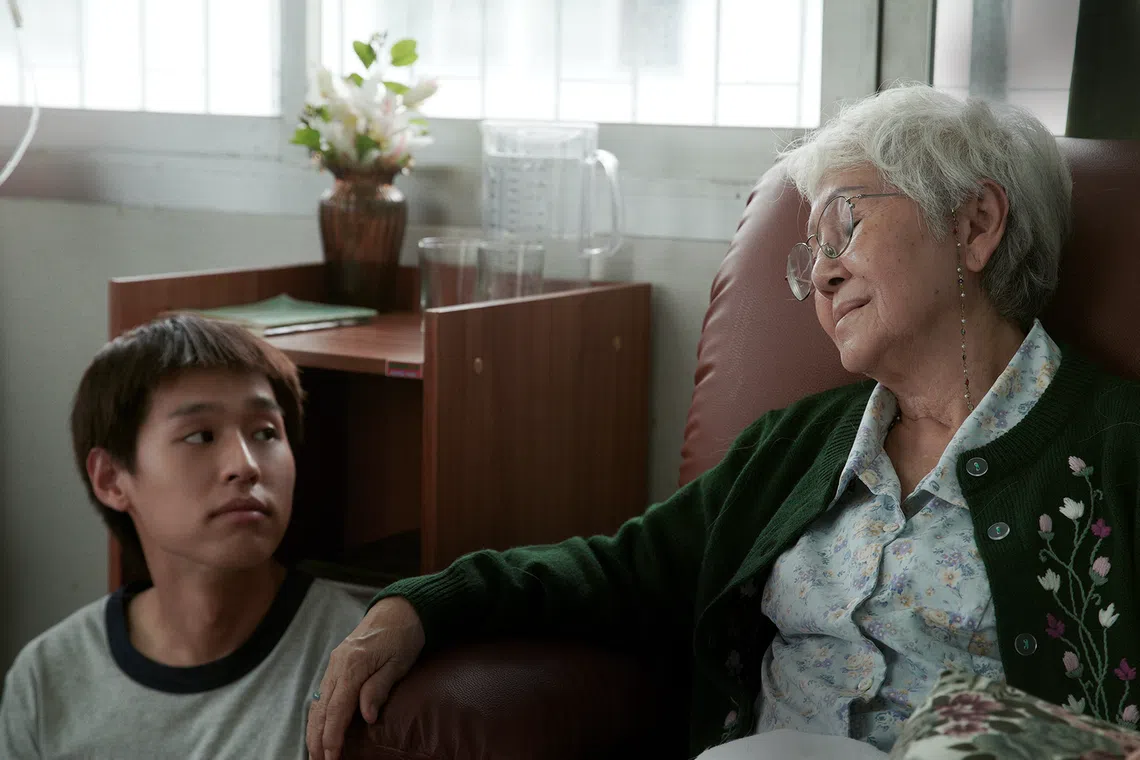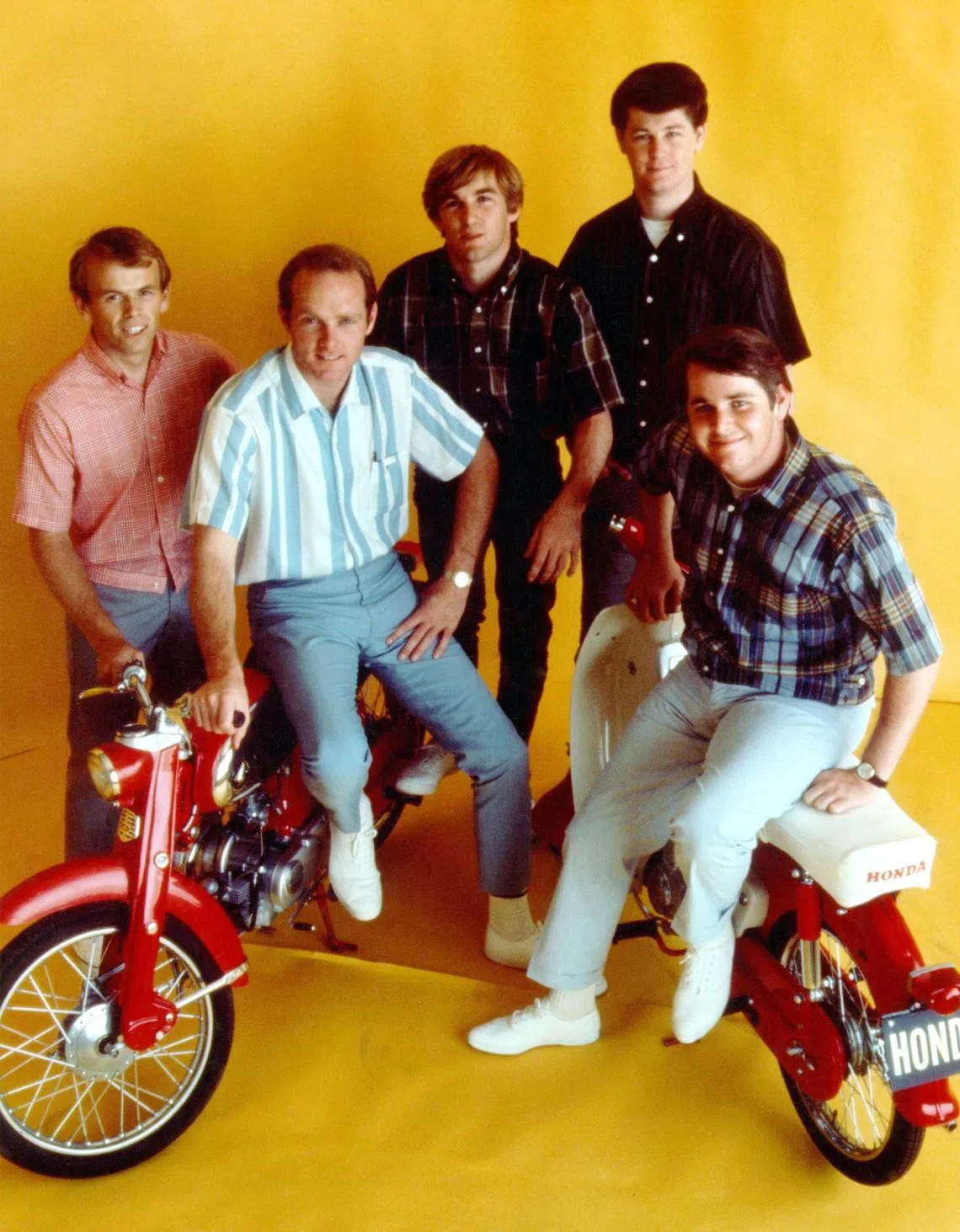At The Movies: How To Make Millions Before Grandma Dies is a hit, The Beach Boys nails the music
Sign up now: Get ST's newsletters delivered to your inbox

Putthipong “Billkin” Assaratanakul (left) and Usha Seamkhum in How To Make Millions Before Grandma Dies.
PHOTO: GOLDEN VILLAGE
Follow topic:
How To Make Millions Before Grandma Dies (PG)
126 minutes, opens on May 30
3 stars
The story: A teenage university dropout (Putthipong “Billkin” Assaratanakul) quits his game-caster gig to care for his grandma (Usha Seamkhum) when she is diagnosed with end-stage cancer. The movie’s title is not subtle about his motives.
Thailand’s biggest film of the year to date, surpassing Hollywood blockbuster imports like Godzilla X Kong: The New Empire (2024), is the unassuming local drama How To Make Millions Before Grandma Dies. Ticket sales have crossed 334 million baht (S$12.3 million).
Thai-Chinese pop idol Billkin stars as a slacker named M, which could well stand for “mercenary”. He ingratiates himself with Amah, moving in with her into her Bangkok Chinatown tenement home and taking her to the doctors.
He has competition for the cool inheritance in the form of her two adult sons, a married upstart broker (Sanya Kunakorn) and a ne’er-do-well (Pongsatorn Jongwilas). M’s struggling single mum (Sarinrat Thomas) is the daughter and the sole decent character.
Amah, no dotard, sees through her fawning progenies. “You are sowing seeds in the hope of reaping them,” she chides. Thai actress Usha has only ever acted in commercials and she is a natural in the role.
Also making his feature debut is Bad Genius The Series (2020) television director Pat Boonnitipat, who maintains an even keel despite M’s emotional growth turning predictably sentimental.
This credible slice of life inspired by contemporary true events is a knowing account of Confucian family dynamics encompassing filial piety, favouritism towards boys and the tradition’s generational fallout.
It reminds the young of their obligations to the old, while asking the dying to consider what they owe the living.
Hot take: The heart-warming family saga is a hit for good reason other than Billkin’s loyal fan base. It resonates with Asia’s ageing societies, where eldercare is a pressing issue.
The Beach Boys (PG13)
115 minutes, available on Disney+
3 stars

(From left) Al Jardine, Mike Love, Dennis Wilson, Brian Wilson and Carl Wilson of American band The Beach Boys are featured in the Disney+ documentary The Beach Boys.
PHOTO: MICHAEL OCHS ARCHIVES
The story: An origin saga of The Beach Boys from their California boyhood to the formation of their family band in 1961 and evolution into a revolutionary pop-rock act.
There is already a wealth of material, including no fewer than 10 films, on “America’s band”.
The Disney+ production The Beach Boys has previously unseen archival footage but little to add to the much-covered sibling dynamics of Brian, Dennis and Carl Wilson, and their legal disputes with cousin Mike Love.
The documentary, billed as a “celebration”, is light on Brian’s drug addiction and mental health struggles. It verges on hagiographic: American singer-rapper-actress Janelle Monae, Fleetwood Mac legend Lindsey Buckingham and producer Don Was are among the new interviews bearing testimony to Brian’s “genius”.
That he was, though. He was the main songwriter, arranger-cum-producer. Hollywood veteran Frank Marshall of The Bee Gees: How Can You Mend A Broken Heart (2020) and Thom Zimny, a collaborator of American rock god Bruce Springsteen, are the movie’s co-directors, and the music is what they get right.
The show gathers input from surviving members, including Brian and Al Jardine, to detail the formulation of the outfit’s harmonic vocals; how their wholesome, upbeat melodies of sun and surf lost cultural relevance; how the conflict between art and commerce impacted their sound; and how their rivalry with Brit quartet The Beatles inspired their experimental masterpiece Pet Sounds in 1966.
The album was a crushing commercial failure. Fans just wanted the fun, fun, fun, and it is these later years of reinvention in their six-decade history that make for a messier, more interesting story than a standard show-business rise and fall.
Hot take: More whitewash than surf’s up, but as a document of the creative process, this music biopic is illuminating.


